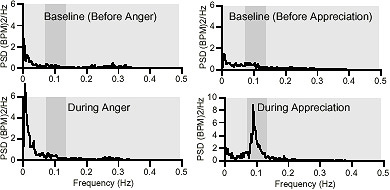Search Research Library:
Research Library
Publication
The Effects of Different Emotional States and a New Stress Management Intervention on Autonomic Regulation of the Heart
Abstract
Emotional stress directly impacts autonomic nervous system function and is a significant risk factor for cardiovascular disease. This study examined the effects of a new stress management intervention, ‘Freeze-Frame,’ on autonomic regulation of the heart and sympathovagal balance, assessed by power spectral analysis of heart rate variability (HRV), in a laboratory setting and in the workplace. In the laboratory, 20 subjects first experienced self-induced anger and then used the Freeze-Frame technique to self-generate a focused state of appreciation. In the workplace, Holter monitoring was used to assess the effects of Freeze-Frame used in response to real-life stress. Distinct shifts in autonomic activity and balance correlated with anger and appreciation. Anger produced a disordered HRV waveform and a sympathetically-dominated power spectrum, while appreciation, induced via the Freeze-Frame technique, produced a spectral shift towards increased parasympathetic activity and increased order in the HRV waveform. Through Freeze-Frame, subjects were able to enter and maintain a state of ‘entrainment’, in which other physiological systems frequency-lock to the primary HRV rhythm of ~0.1 Hz. These data suggest that stress management techniques that induce positive emotional shifts are a practical, effective approach to promoting a more cardioprotective autonomic profile, which may benefit patients with heart failure, coronary artery disease and hypertension.

Figure 1.
Group Mean HRV Power Spectra: Anger vs. Appreciation
Mean power spectral density analysis of a group of subjects comparing the effects of anger and appreciation on the autonomic nervous system. Anger caused a large increase in the activity of the sympathetic system, which is reflected as increased power in the far left-hand region of the power spectrum. Appreciation, on the other hand, increased the activity in the parasympathetic system, which helps protect the heart.

